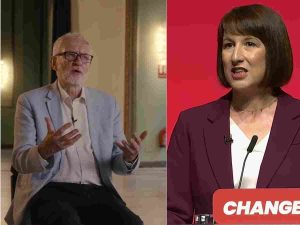Polling on the Labour Party’s ‘GB Energy’ has shown the GB public has a real thirst for public ownership. As the general election has rolled on, however, more and more people have noticed something – namely that this ‘energy company’ is something else entirely.
It’s a reality Labour lord Pat McFadden had to fess up to in an interview with Laura Kuenssberg on the last Sunday before the election:
Pat McFadden admits GB energy isn’t an energy company at all, but is actually a finance company designed to generate private sector investment.
We saw how well PFI worked in the NHS. Now Labour wants to roll it out in the energy sector. pic.twitter.com/mRLmWXJEQa
— Saul Staniforth (@SaulStaniforth) June 30, 2024
GB Lethargy
Earlier this year, YouGov polled people on GB Energy. It wrote of its findings:
New polling from YouGov, commissioned by the think tank Common Wealth, shows that 66 per cent of voters support the policy of creating “GB Energy — a publicly owned energy company”, compared to 6 per cent of voters who were opposed.
Alongside this, when asked whether renewable energy infrastructure should be publicly owned or privately owned, 64 per cent answered publicly owned and 8 per cent preferred private ownership. 22 per cent of those questioned answered “don’t know”, while 6 per cent answered “neither”.
The polling, from YouGov, shows that eleven times as many people support the GB Energy proposal as oppose it.
61 per cent of those surveyed who voted Conservative in 2019 supported establishing a publicly owned clean energy company, with just 11 per cent favouring private ownership.
You’ll notice these people – Tory voters no less – support “establishing a publicly owned clean energy company”. This isn’t that surprising, as YouGov has elsewhere noted its “surveys have always highlighted that state ownership of companies and industries tend to be popular with the public”.
So what’s the problem?
The problem is that GB Energy won’t be a “publicly owned clean energy company”. So what will it be?
Kuenssberg put the following to McFadden:
Now Labour’s plan… is to create this organisation called ‘GB Energy’, but a lot of our viewers have got in touch with us saying ‘what is it, really?’ Would GB Energy actually be a company that produces energy that ends up being pumped into people’s homes?
McFadden responded (we’ve emboldened the non-waffle):
It’s a publicly-owned company that’s designed to drive the investment in some of the new technologies we’re going to need in the coming years in solar; in wind; in hydrogen, and so on. And in doing so – in the government stepping up to the plate – making sure that the private sector does too, because one of the things that’s clouded this debate – maybe made it less clear than it might be – is all around the world, countries trying to meet this transition – the vast majority of what’s spent will be spent by the private sector.
But we believe there is a real role for a publicly-owned company to help to make a market for some of these new technologies in a way that the private sector is holding back from at the moment, and when you do that you get the benefit of releasing that private sector investment too.
McFadden was smirking throughout this. The sense you got was that he was revealing the secret behind a clever magic trick rather than admitting to something the public is going to be furious about 12 months from now.
Kuenssberg followed:
But one of the reasons it’s been confusing is because representatives from the Labour Party have said different things about this from time to time. So I ask you again; can you be really clear; will it be a company that will produce energy that will be pumped into people’s homes, or will it merely – as you suggest – be an investment vehicle that’s essentially writing cheques to encourage other companies to do the same?
Supporting her point, Labour has literally referred to GB Energy as a “clean energy company” in the past – something it demonstrably will not be:
GB energy is an investment company with £8bn of seed funding. It won’t touch the sides.
Energy should be nationalised as promised.
— Essex Boy (@GregClinker) October 28, 2022
A smirking McFadden replied:
It’s not going to sit alongside N-Power, or RWE, or these companies; this is a different thing. This is a publicly-owned company that is investing in making sure that we have the jobs of the future for these new technologies; that releases the private sector so that Britain plays a leading role in this transition.
So not so much an energy company as a hot air company.
Labour: release the private sector!
“Release the private sector” he says. What are they being released from? The burden of rampant, unchecked profiteering?
As the End Fuel Poverty Coalition notes:
Energy giants have pocketed over £420 billion in profits since the energy crisis started according to a new analysis of company reports.
That’s strange, isn’t it – that they’d be making such profits in the middle of a ‘crisis’? Also, notice how small Labour’s proposed £8bn is compared to these profits? It’s almost as if Labour’s proposal isn’t a serious one at all:
Kevin Maguire on our profiteering energy system: “Its a system run by private companies making profits. Thats what its about.. if you had a publicly run owned and controlled energy system…”
Andrew Pierce: Labour aren’t going to do that
Maguire: “I think Starmer is wrong” #GMB pic.twitter.com/cJuFkkOqQH
— Saul Staniforth (@SaulStaniforth) April 19, 2023
The idea behind privatisation was that we put our essential public utilities into the hands of the private sector so that competition would drive advancement in a fashion the public sector couldn’t match. With GB Energy, Labour is doing two things:
- Admitting the private sector isn’t driving innovation at all.
- Arguing it’s tax payers who should pay to drive the innovation these companies failed to deliver.
Why not pass laws which mandate energy companies have to spend a percentage of their profits on innovation?
Or – better yet – WHY NOT REVERSE THIS FAILED EXPERIMENT IN PRIVATISATION?
The answer is simple: the energy companies have money; Labour wants money, and neither group gives a shit about families going cold this winter.
Response
Of course, this isn’t the first time people have noticed Labour’s Great British Energy company is a Great British “sham”:
🤷 The Labour representative on #bbclaurak just now – Pat McFadden – has again confirmed that GB Energy will not produce or sell any energy.
He also refused to guarantee that it will lower people’s bills by £300/year, as Labour recently claimed.
GB Energy is a sham. pic.twitter.com/fjLQzJoYr5
— Olaf Stando 🌻 (@OlafSNP) June 30, 2024
In fact, the Canary has repeatedly told you this. Other are pointing out there are yet more inconsistencies in Labour’s internal logic on energy:
McFadden says renewables are better for energy security & bills
How is it better for security when the UK govt wont own any energy production & e.g our national grid is owned by (among others) a foreign state. As for bills the UK govt aren’t introducing price controls, are they? pic.twitter.com/U3SL0JMu0G
— Saul Staniforth (@SaulStaniforth) June 30, 2024
No, Labour
Labour understands that people want publicly-owned energy companies; they also don’t to upset their wealthy mates. The solution? To create a publicly-owned company which won’t produce any energy. This is two birds with one stone, as it poses no risk to the rich while simultaneously tarnishing the image of public ownership.
The problem for Starmer and his anti-Labour Party is they’re not as smart as McFadden’s smirking might suggest. They don’t see it yet, but this fake energy company is a noose around their neck which will only tighten between now and the next election.
Featured image via BBC iPlayer and the Canary




